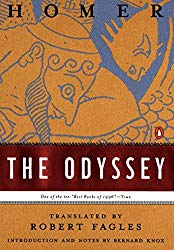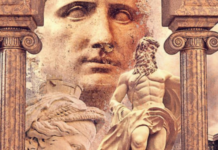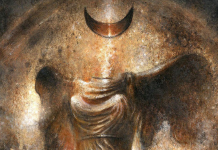
When Cersei Lannister first appeared in the Game of Thrones universe, I was fascinated by the unusual choice of her name. Despite the difference in spelling, her name immediately called to my mind the witch goddess, Circe, who makes a brief but memorable appearance in Homer’s classic poem, The Odyssey. I haven’t been able to find confirmation, but I can’t believe that this choice of name is a coincidence.
As I devoured the Game of Thrones television series, I continued to see similarities in Circe’s myths and the development of Cersei’s story. I found it intriguing to watch how a theme that was prevalent in ancient mythology is still coming into play in such a big way in today’s popular culture.
In both of these stories we see the transformation of a powerful feminine archetype, a goddess or a queen, into something lesser, or something sinister, something to be contained and defeated. Keeping this in mind, let’s go back to the source, to Circe’s story, and see if we can get to the heart of this captivating figure.

The Circe of Greek mythology is the daughter of the Titan Helios, the ancient god of the Sun, and the ocean nymph, Perse. This is no lowly pedigree: she is the daughter of the Sun and the ocean. She was known as a powerful witch, highly proficient with potions and herbcraft, with the ability to transform humans into animal form at will.
Circe is beautiful, golden like the sun, able to enchant with her appearance and her soft words, but she brings suffering and misfortune to the men who cross her path. She is intelligent, accomplished, skilled and independent, but the few stories that survive about her paint the picture of a dangerous and jealous woman who seems to take uncharacteristic leave of all of her senses when she falls in love or is wronged in love. Circe appears in several ancient sources, but let’s take a look at the most famous one, the tale of Circe that appears in The Odyssey in books 10 and 11.
The Odyssey is a Greek epic poem, attributed to Homer, believed to have been written in the eighth century BCE. Circe appears in the story when Odysseus and his crew manage to make it to her island home, having suffered great trials on their journey home from the Trojan War — most recently the loss of all of their ships but one, and most of their companions, to a race of cannibal giants.
As you can imagine, Odysseus and his men were highly distraught and spent a few days weeping and lamenting on the beach. When they were somewhat recovered, but still weeping, half of the company, a group of 23 men, set out to pay a rather overdue visit to the goddess whose dominion they had entered.

When the men arrived at her serene woodland home, she was enjoying her own company and singing prettily while weaving ambrosial fabric on her loom. The men noticed that there were many wild animals lounging around Circe, wolves and lions, creatures who didn’t attack but only watched the men in an uncanny way, as if they were bewitched.
All of Odysseus’ men — except one — answered Circe’s invitation and entered her home. She laid out a feast of cheese, barley, and fine wine, and they happily dove in. However, unbeknownst to them, the feast included a magical ingredient that quickly turned them all into pigs. She then locked them in a pigsty, threw some acorns to them, and that was that. The men were pigs in form, but still had their human minds and senses.
The one man escaped who this trap ran back to Odysseus to tell him what had happened. When Odysseus headed off to rescue them, the god Hermes appeared, and advised him on how to evade Circe’s charms and remain in human form.
When Odysseus arrived at Circe’s abode, she invited him in, offered him wine, and was quite taken aback when he didn’t transform into a pig. She took up her wand, and again tried to work her magick, but still he remained unchanged. Odysseus drew his sword against her, she recognized his strength and his true identity, and she immediately invited him into her bed. Odysseus became Circe’s lover, and then persuaded her to return his men to their human forms.
They all lived together on Circe’s island, feasting and enjoying her bounty for more than a year. Circe and her nymph attendants fed, bathed and clothed Odysseus and his men.
Finally, after that year of revelry had passed, Odysseus and his men decided that it was time to continue their journey home. Circe advised them on the best way to proceed and made them aware of the dangers they would encounter. And off they went.
In this interlude, merely a brief mention in the epic tale of the Odyssey, Circe goes from a terrifyingly powerful goddess, to a doting lover, to a domestic servant, keeping a year-long party and feast going for a large group of rather uncouth sailors.

To get a better understanding of the character of Circe, let’s go back to when she transforms the men into swine. You have to laugh at the appropriateness of the choice of animal. She doesn’t turn them into lions and wolves, but pigs.
Perhaps we could look at things from Circe’s point of view. A rough crew of exhausted and famished men shows up unannounced at her home, makes use of the resources on her island without paying homage to her or even acknowledging her divinity, and then enjoys the food and wine she puts before them without offering or thanks. Circe, being a witch and a goddess, was able to see the true forms and lowly intentions of the men, and chose the most appropriate form to reflect this.
When Odysseus appears to her, she was able to discern that he was something different. Not entirely noble or perfect, but a hero of sorts. She chose to allow him to stay on her island for a year, to enjoy her hospitality, and didn’t try to bewitch him into staying with her when the time came for him to return home. She even provided him with the information he needed to be successful in his journey, without bargain or price.
Although Circe’s ability to transform men into animals seems to spark our imagination most, her greatest power was her understanding of the true nature of those around her, and of herself as well. She was able to transform plants and herbs into magical potions and remedies, to transform raw materials into fabric fit for the gods with her loom, and to see through the facades people create around themselves. She was able to create a place for herself in a world of vengeful gods and callous mortals by discovering and honing her own unique powers.
Call upon Circe when you want to reveal the true nature of the forces around you, and to transform the resources that you have around and within you into exactly what you need.
As an aside, as I did my research for this article, I came across the novel, Circe, by Madeline Miller. I am just diving into it now, but it is a beautifully written account of Circe’s life, from her own point of view.
Image credit: Game of Thrones, Bruno Caimi, Randy Tarampi, Jonathan Miske









